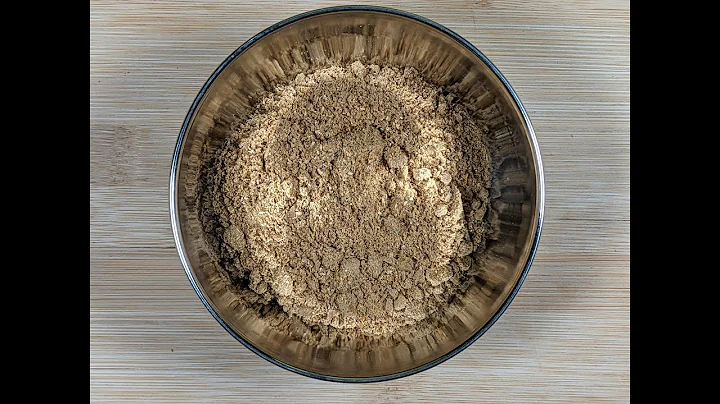Master the Art of Cooking Beans Without the Embarrassing Aftermath
Table of Contents:
- Introduction
- Why Beans Cause Gas
- The Health Benefits of Beans
- Prep Step 1: Soaking Beans
- Prep Step 2: Using a Pressure Cooker
- Prep Step 3: Using Baking Soda
- Prep Step 4: Using Kombu
- Prep Step 5: Adding Aen or Epazote
- Prep Step 6: Adding Digestive Spices
- Prep Step 7: Adding Carrots
- Tips for Canned Beans
- Beans that are Easier to Digest
- Beans to Avoid or Soak
- Remedies for Gas and Bloating
- Conclusion
Why Beans Cause Gas
Beans are a nutritious and versatile food, but their unfortunate side effect of causing gas can be off-putting for many. In this article, we will explore why beans cause gas, the health benefits they offer, and most importantly, how to make them more digestible to minimize gas and bloating. With a few simple tricks and tweaks to your cooking process, you can enjoy all the benefits of beans without the uncomfortable aftermath.
Introduction
Beans, often referred to as nature's protein powerhouse, are an essential part of a plant-based lifestyle. They are packed with fiber, which helps regulate bowel movements and lower cholesterol. Additionally, beans are rich in iron, magnesium, vitamin B6, and other essential vitamins that contribute to overall health and well-being. Incorporating beans into your diet can even reduce the risk of heart disease and certain cancers.
Prep Step 1: Soaking Beans
One of the key steps in preparing beans to make them more digestible is soaking them before cooking. Soaking helps reduce the gas-producing sugars in beans, making them easier to digest. To soak beans properly, place the dried beans in a pot or large bowl and cover them with water. Let them sit for 6 to 8 hours or overnight. After soaking, drain and rinse the beans before cooking them in fresh water. This step helps remove some of the indigestible sugars that cause gas.
Prep Step 2: Using a Pressure Cooker
In addition to soaking, using a pressure cooker like an Instant Pot can further aid in breaking down the sugars in beans. Pressure cooking helps degas the beans, making them even more digestible. After rinsing the soaked beans, add them to your pressure cooker with at least 2 inches of water above the beans. You can also add seasonings like cumin, onions, oregano, and garlic for added flavor. Set your cooking mode to high for about 20 minutes. Soaking and pressure cooking combined make beans much easier to digest.
Prep Step 3: Using Baking Soda
Another hack to help break down the hard-to-digest sugars in beans is using baking soda. Simply add a quarter teaspoon of baking soda per cup of dried beans to the soaking water before cooking them. Let the beans soak for 6 to 8 hours or overnight, then rinse them several times before cooking. This method not only helps reduce gas but also speeds up cooking time and gives the beans a buttery texture.
Prep Step 4: Using Kombu
Kombu, a type of seaweed used in Japanese cooking, can aid in improving the digestion of beans. Kombu contains enzymes that break down difficult plant compounds and fibers, making them easier for the body to process. In addition to reducing gas and bloating, it adds a rich, complex flavor to the beans due to its Umami taste. Simply add a strip of Kombu to the beans while cooking to enjoy its digestion-boosting benefits.
Prep Step 5: Adding Aen or Epazote
Aen, an Indian spice, and Epazote, a herb commonly used in Mexican cuisine, are known to decrease gas and aid digestion. Aen resembles cumin seeds but tastes more like oregano and Anis. Epazote has notes of oregano, Anis, and citrus. Adding these spices to your pot while cooking can help alleviate gas production during digestion, making beans more enjoyable to consume.
Prep Step 6: Adding Digestive Spices
Incorporating ginger, turmeric, fennel, and cumin into your bean recipes can also aid digestion. Ginger and peppermint tea can soothe the stomach and relieve gas and bloating. Fennel seeds help regulate the gut, reducing bloating. Consider adding these spices to your cooking or enjoying them as teas to enhance digestion when consuming beans.
Prep Step 7: Adding Carrots
Adding carrots to your beans while cooking is a lesser-known trick to make them less gassy. It's a simple addition that can help reduce the gas-producing effects of beans without compromising their taste. If you're in a crunch and only have canned beans, rinsing and soaking them for a short period can still lessen their gas production.
Beans that are Easier to Digest
Not all beans are created equal when it comes to gas production. A few varieties are easier to digest, making them ideal choices for those who are more sensitive to gas. Atsuki beans and black-eyed peas are less likely to cause gas. Mung beans and lentils are also easier to digest compared to other popular beans. Including these beans in your diet can minimize the discomfort associated with gas.
Beans to Avoid or Soak
While all beans contain hard-to-digest sugars, some are more notorious for causing gas and bloating. Navy beans, chickpeas, and kidney beans are among the offenders. However, soaking them before cooking can help reduce their gas-producing effects. Soaking any beans, especially those known to cause more gas, is a crucial step to enjoy them without discomfort.
Remedies for Gas and Bloating
If you've consumed beans without using any of the digestion-boosting methods mentioned earlier, there are still ways to alleviate gas and bloating. Sipping ginger tea or peppermint tea can provide relief from intestinal discomfort. Fennel seeds also help regulate the gut, reducing bloating. Incorporate these remedies into your routine to minimize the discomfort caused by beans.
Conclusion
Beans are a valuable source of nutrition and should not be avoided due to their gas-producing effects. By following simple preparation steps, such as soaking, pressure cooking, using baking soda, and adding digestive spices, you can make beans more digestible and enjoyable. Consider incorporating the digestive hacks mentioned in this article to maximize the benefits of beans without the uncomfortable side effects. So go ahead and embrace the wonders of beans in your plant-based diet and reap their nutritional rewards.
Highlights:
- Beans are a nutritional powerhouse, but their gas-producing effects can be off-putting.
- Soaking beans before cooking helps reduce gas by breaking down indigestible sugars.
- Using a pressure cooker and adding baking soda further aid in making beans more digestible.
- Adding Kombu seaweed, Aen or Epazote spices, and digestive herbs can reduce gas production.
- Carrots, ginger tea, and peppermint tea also help alleviate gas and bloating.
- Some beans, like atsuki beans and black-eyed peas, are easier to digest than others.
- Navy beans, chickpeas, and kidney beans are among the beans that produce more gas.
- Remedies like ginger tea, peppermint tea, and fennel seeds can provide relief from gas and bloating.
- Don't let gas deter you from enjoying the nutritional benefits of beans in a plant-based diet.
FAQs:
Q: Are beans good for you?
A: Yes, beans are highly nutritious, packed with fiber, plant-based protein, iron, magnesium, and essential vitamins. They can help regulate bowel movements, lower cholesterol, reduce the risk of heart disease and certain cancers, and keep you fuller for longer.
Q: How can I reduce gas and bloating caused by beans?
A: Soaking beans before cooking, using a pressure cooker, adding baking soda, Kombu seaweed, and digestive spices like Aen or Epazote can help reduce gas production. Additionally, remedies such as ginger tea, peppermint tea, and fennel seeds can alleviate gas and bloating.
Q: Which beans are easier to digest?
A: Atsuki beans and black-eyed peas are among the beans that are easier to digest. Mung beans and lentils are also more gentle on the digestive system compared to other popular beans.
Q: Can I still enjoy canned beans without experiencing gas?
A: While canned beans may be more challenging to digest, rinsing and soaking them for a short period can still help lessen their gas-producing effects. Adding digestive seasonings like mentioned earlier can further aid in reducing gas.







